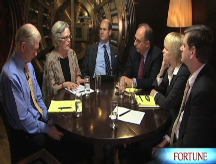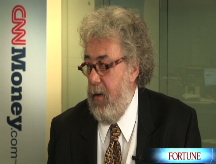Treasury money market funds: Doomed?
Investor Daily: As Treasury yields nose-dive, some funds may struggle to survive.
NEW YORK (Fortune) -- When the Federal Reserve lowered its interest rate yet again last week, the future grew a little bleaker for Treasury-only money market funds, which account for one-fifth of the $3.7 trillion invested in money market funds.
Now that three-month Treasurys are yielding just 0.01%, research firm iMoneyNet reports that the funds' average yields are down to 0.22%, which is barely enough to keep them in business.
"It's hard to keep these products rolling when they remains unprofitable for an extended period," says Jeff Tjornehoj, a senior analyst at Lipper. If money market funds can't even deliver pennies, their managers will have difficulty rationalizing expense ratios to cover the costs of maintenance. The average retail taxable money fund has a fee of 0.75%.
Funds concentrated in Treasurys are hunkering down for a long fasting period. National City's Allegiant Asset Management and Wachovia's Evergreen Investments have shuttered their funds' doors to new investors so that they don't have to buy Treasurys with ever-shrinking yields. Even Vanguard, with its tiny expense ratios, has placed daily purchase limits on its Admiral Treasury Money Market Fund and Treasury Money Market Fund.
But most funds have a long way to go before they're forced to shut down altogether, according to Peter Crane, the head of money market research firm Crane Data. "The idea of money funds going out of business is incorrect," he says. "Even the Treasury-only funds have fees that they can waive." Crane predicts that some funds may consider paying negative yields until the tide turns - "like a checking account with a monthly fee," he says.
Others are less optimistic about the future of Treasury money market funds - Credit Suisse, for one, recently closed its money market business altogether. "If the low interest rate environment persists for a few months, the likelihood that funds will liquidate and merge is increasing," says Tjornehoj.
The grim forecast for the money market raises the question: Should you pull your investments out? First, don't panic - if a fund merges into another one, your assets are cleanly transferred to the new portfolio. If it's liquidated, you'll get a check in the mail. But if you're in a fund that's heavily invested in Treasurys and you want to actually make money, then take the cash and run - it's unlikely that you'll see returns for a while.
Of the three-types of taxable money market funds - Treasurys, government and agency, and prime - one category is doing much better than the rest. Prime funds, which comprise 45% of all money market funds, can invest in vehicles such as corporate debt; as a result, their yields aren't yoked to those of Treasurys, and they often have better payouts as a result.
Prime funds may have more wiggle room, but their freedom can also be a liability. That came to light in September, when the Reserve Primary Fund, a preeminent prime fund, "broke the buck." Its value fell below $1 due to risks it took on buying debt from Lehman Brothers. When that happened, investors fled the money market in droves; the government lured them back by agreeing to back the funds' debt through next year.
Inflows to prime funds have outpaced other money fund sectors as of late, according to Connie Bugbee, iMoneyNet's managing editor. "Now that there are so many federal programs in place," she says, "confidence is up - the market is definitely trending towards prime funds."
Tjornehoj cautions investors to make sure that the funds hold trustworthy securities. "Before you invest in a prime fund, read the prospectus carefully. Understand first why they have a better yield."
Of the prime funds out there, safe bets include American Century's Prime Money Market Fund, which has a 2.3% yield, and the enormous Fidelity Cash Reserves, which yields 2%. Another solid option is Vanguard's Prime Money Market Fund, which currently has a yield of 2.5% - more than enough to cover its 0.24% expense ratio.
While Treasury funds don't have the flexibility to spring for alternate investments (they're contractually bound to stick to T-bills), prime and government funds may be able to buy new-fangled vehicles such as FDIC-backed bonds, which offer greater yields than Treasurys.
"If they get permission to buy FDIC-backed bonds, it would be a godsend - it'll enable them to continue making a spread over their fees," says Rajiv Setia, the fixed income strategist at Barclays. "When money funds are yielding nothing, how do you justify their existence?" ![]()
-
 The retail giant tops the Fortune 500 for the second year in a row. Who else made the list? More
The retail giant tops the Fortune 500 for the second year in a row. Who else made the list? More -
 This group of companies is all about social networking to connect with their customers. More
This group of companies is all about social networking to connect with their customers. More -
 The fight over the cholesterol medication is keeping a generic version from hitting the market. More
The fight over the cholesterol medication is keeping a generic version from hitting the market. More -
 Bin Laden may be dead, but the terrorist group he led doesn't need his money. More
Bin Laden may be dead, but the terrorist group he led doesn't need his money. More -
 U.S. real estate might be a mess, but in other parts of the world, home prices are jumping. More
U.S. real estate might be a mess, but in other parts of the world, home prices are jumping. More -
 Libya's output is a fraction of global production, but it's crucial to the nation's economy. More
Libya's output is a fraction of global production, but it's crucial to the nation's economy. More -
 Once rates start to rise, things could get ugly fast for our neighbors to the north. More
Once rates start to rise, things could get ugly fast for our neighbors to the north. More












